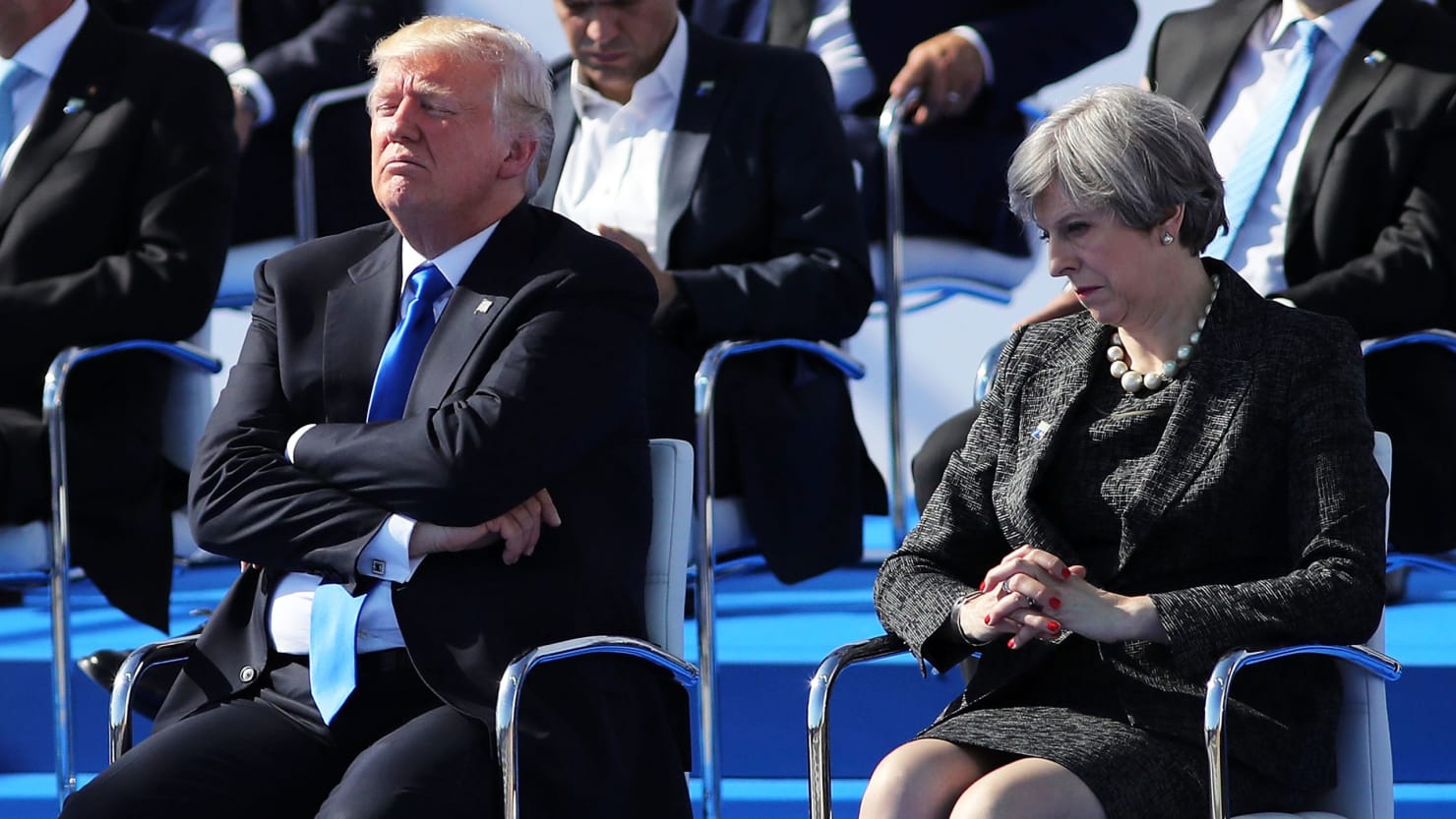rusreality.com
[JB linguistic note: RIA Novosti translates Macron's verbal construction "la diplomatie de l’invective publique" as "the public diplomacy battlefield." Meanwhile, infonews.bid renders Macron's words as "public diplomacy criticism." And Daily Beast, perhaps most accurately, translated the French president's utterance as "the diplomacy of public invective" (a far cry from the generally accepted definition of the supposedly "benign" -- or at least polite -- "public diplomacy"). See text from the four articles below.]
MOSCOW, may 28 — RIA Novosti. The President of France Emmanuel macron called a firm handshake with the American leader Donald trump, which occurred during their first meeting before the NATO summit in Brussels, a “moment of truth”, meaning that the parties do not make concessions.

“Our handshake, it’s not just because it is not the alpha and omega of politics, it is a moment of truth,” macron said in an interview with Journal du Dimanche. “We had to show that we don’t do small, even symbolic concessions, but we should also not draw too much media attention,” added the President.
As writes the edition, a firm handshake leaders should mean the intention of the French President to “fit into the logic of equal partners”, as well as send the world a signal about the beginning of diplomatic contact that cannot be broken.
“Donald trump, the Turkish President or the Russian President proceed from the logic of force, and I don’t care. I believe not in the public diplomacy battlefield, and in bilateral dialogue, I won’t miss anything, so it is possible to force to respect each other,” said macron.
The extremely firm handshake of U.S. President Donald trump and his French counterpart Emmanuel Macron on their first meeting before the NATO summit in Brussels attracted the attention of American journalists who watched the event.
Trump meets his match in handshake Macron https://t.co/Ys3S4wChX1 pic.twitter.com/OApBZEWB5X
***
lejdd.fr
Macron au JDD : "Ma poignée de main avec Trump, ce n’est pas innocent"
EXCLUSIF - Avant de quitter le sommet du G7, après une semaine diplomatique intense, le président de la République s’est confié samedi au Journal du Dimanche.

Emmanuel Macron a échangé une poignée de mains très commentée avec Donald Trump, jeudi. (Reuters)
Cette poignée de main avec Donald Trump, jeudi à Bruxelles, qui a été tant commentée, il l’a pensée, soigneusement préparée. Conscient qu’elle serait un signal envoyé au monde au tout début d’une séquence diplomatique impossible à rater. "Ma poignée de main avec lui, ce n’est pas innocent, ce n’est pas l’alpha et l’oméga d’une politique mais un moment de vérité", confie au JDD Emmanuel Macron, samedi matin à Taormina, avant d’entamer sa dernière séance de travail du G7, qui s'est soldé en milieu d'après-midi par un échec des négociations sur le climat.
"Il faut montrer qu'on ne fera pas de petites concessions"
Il poursuit : "Il faut montrer qu’on ne fera pas de petites concessions, même symboliques, mais ne rien surmédiatiser non plus". Ces phalanges blanchies, cette pince qui enserre les doigts de Donald Trump, ce regard planté dans celui du chef d’État le plus puissant de la planète, c’est donc un marqueur pour signaler une volonté de s’inscrire dans une logique d’égalité entre pairs. "Donald Trump, le président turc ou le président russe sont dans une logique de rapport de forces, ce qui ne me dérange pas. Je ne crois pas à la diplomatie de l’invective publique mais dans mes dialogues bilatéraux, je ne laisse rien passer, c’est comme cela qu’on se fait respecter."
***
THE PRESIDENT OF THE TRUMPET, AND THE NEWLY ELECTED PRESIDENT OF FRANCE, EMMANUEL MACRON EXCHANGED WHITE ASSOCIATIONS HANDSHAKE HTTPS://T.CO/GQPPJ3UEYAPIC.TWITTER.COM/FSZGMJCAX2
— CNN (@CNN) MAY 25, 2017
the macron told Sunday Newspaper journal that his approach, the meeting was about how to get respect, say that he was not “innocent”. He told the paper in French, he wanted to show that he “will not make small concessions, even symbolic,” adding that he didn’t want to do too much, no more.
“Donald trump, the President of Turkey and the President of Russia, to see things from the point of view of relations of power, which doesn’t bother me,” he said. “I don’t believe in public diplomacy criticism, but in my bilateral conversations I will leave nothing will take place. This is how you get respect.”
THIS IS A PRETTY INTENSE HANDSHAKE BETWEEN THE MACRON AND THE TRAMP PIC.TWITTER.COM/NSETDCPXKX
— COLIN JONES (@COLINJONES) MAY 25, 2017
the macron met with his counterpart of Germany Angela Merkel for the first time since its opening last Monday. He was elected as President, earlier this month, in contrast to the victory of the far-right candidate marine Le Pen.
NOW READ: Senior research team in charge of the police League
centrist candidate got 66% of votes in the second round of the Presidential elections against national Front, the candidate of 34%.
the margin of victory was much higher than 20 percentage points deviation of the forecasts before the vote.
at this time, trump to accept the handshake, it has become quite well known.
THE HONOR TO WELCOME PRIME MINISTER @ABESHINZO IN THE UNITED STATES. PIC.TWITTER.COM/F6TVFZ6SMJ
— PRESIDENT OF ASSET (@@POTUS) FEBRUARY 10, 2017
He tends to do quite long and uses a strange technique of capturing his colleague in his arms and giving him a blow dry before releasing them, but other world leaders seem to be caught.
PRES. TRUMP AND MINISTER OF CANADA JUSTIN TRUDEAU, TO SQUEEZE HANDS IN THE OVAL OFFICE HTTPS://T.CO/DZ5DNUIHD0PIC.TWITTER.COM/SNKFJVWUKA
— CNN (@CNN) FEBRUARY 13, 2017
@ACTUALEPAFACTS@JACKIMGITTOS MACRON PROBABLY STUDIED TRUDEAU/TRUMP HANDSHAKE TO PREPARE. PIC.TWITTER.COM/XKACZGQNFV
— LAUREEN HUME (@LAUREEN_HUME) MAY 25, 2017
***
UGLY AMERICAN
President Trump Turned International Diplomacy Into A Fistfight—And Lost
President Trump’s performance in the last leg of his first international trip has European leaders fuming—and American diplomats likening him to a ‘drunk tourist.’

DAN KITWOOD/GETTY
During his inaugural international trip as the leader of the free world, President Donald Trump learned the problem with first impressions—you only get to make one.
After indulging the royals of Saudi Arabia with assurances that he was “not here to lecture”—in exchange for gold chains and glowing orbs—Trump took a much harder stance toward major Western democracies, distancing his administration politically and, in some cases, personally from some of America’s oldest and closest allies. The concept of diplomacy as a pursuit of mutually beneficial terms for both parties stood in stark relief against Trump’s worldview, which divvies up the world into two groups: winners and losers.
In a meeting with European Union leaders on Wednesday, Trump reportedly dubbed the Germans “bad, very bad” and decried current U.S. military commitments to Europe as “unfair to the people and taxpayers of the United States.” During a ceremony at NATO headquarters in Brussels meant to dedicate a memorial to the alliance’s strength in the wake of the 9/11 terrorist attacks, Trump scolded NATO member nations for “not paying what they should be paying.”
Rather than speak to leaders from the 28 nations of which NATO is comprised, Trump instead, it appeared, spoke to his base. Trump declined to recommit the United States to upholding Article 5 of the NATO Treaty, which stipulates that an attack against one member nation is considered an attack against all. The omission—later downplayed by White House press secretary Sean Spicer—underscores threats Trump made as a candidate to treat Article 5 as conditional, based on whether a country was spending enough on defense.
The only form of offensive action Trump seemed to endorse during the event, it seemed, was shoving the prime minister of Montenegro.
(Dusko Markovic, the leader of the small Balkan nation in question, later downplayed the shove as “inoffensive.”)
Even handshakes with allied leaders became confrontational. After a white-knuckle grin-and-grip between Trump and President Emmanuel Macron of France, the newly elected French leader suggested that the salutation “was not innocent.”
Trump’s insistence upon returning stateside that the “trip was a great success for America,” therefore, came as a surprise to European allies who viewed the trip through a much darker lens. Citing Trump’s silence on threats of Russian aggression in the region, his disinterest in committing to deterrence efforts, and his six-against-one stance athwart the enactment of the Paris Agreement, Western leaders left the NATO and G7 talks resigned to the assumption that the era of America intervening on its allies’ behalf is over.
German Chancellor Angela Merkel, recovering from the geopolitical whiplash of meeting with both Barack Obama and Trump in the span of three days, told a Bavarian crowd on Sunday that Europe’s ability to rely on outside protection was “over, to a certain extent. This is what I have experienced in the last few days.” With U.S. leadership signalling an end to the decades-long status quo, Merkel continued, Europe “really must take our fate into our own hands.”
Macron dismissed Trump’s antics as the “diplomacy of public invective,” which could be combated only by strong-armed—or, rather, strong-handed—bilateral talks. Likening Trump to strongmen like Russian President Vladimir Putin and Turkish President Recep Erdoğan, Macron promised a challenge to Trump in future negotiations: “In my bilateral dialogues, I don’t let anything pass—that is how we are respected.”
While the president of France implied that Trump’s bluster could be mitigated by a more muscular approach to bilateral relations, however, U.S. diplomats saw arrogance that could seriously hinder American diplomacy.
“When it comes to diplomacy, President Trump is a drunk tourist,” a State Department official told the Daily Beast. “Loud and tacky, shoving his way around the dance floor. He steps on others without realizing it. It’s ineffectual.”
But far more concerning, the official said, was Trump’s “arrogance” in threatening to single-handedly thwart the Paris Agreement, which obliges member states to slash carbon emissions to combat global climate change. Trump’s reality-show declaration that he’ll make a final decision on his commitment to the accord “next week!” is, in the official’s terms, “an abdication of American leadership.”
“One hundred and ninety-five nations never agree on anything, so when they do, accepting the measure should be easy,” the official said. “The United States needs to be out front on this pact.”
Trump’s explicit skepticism of multinational diplomacy comes at a time when internal tensions within allied nations make stepping back from Europe particularly risky. As recent elections in France, Austria, and the United Kingdom have demonstrated rather dramatically, the European Union’s nationalist-vs.-globalist battles are threatening the world’s largest economic and political union from within.
Meanwhile, an increasingly bellicose Russia—whose post-Cold War ambitions of European expansionism have heretofore largely been contained by NATO—needs little more excuse than a crack in the facade of NATO’s collective defense agreement to encourage more aggression in the vein of past actions in Crimea and South Ossetia.
On both sides of the Atlantic, however, hope continues to spring that the realities of international diplomacy will settle in.
“Still,” the State Department official said, “we continue to hope for the best.”

No comments:
Post a Comment